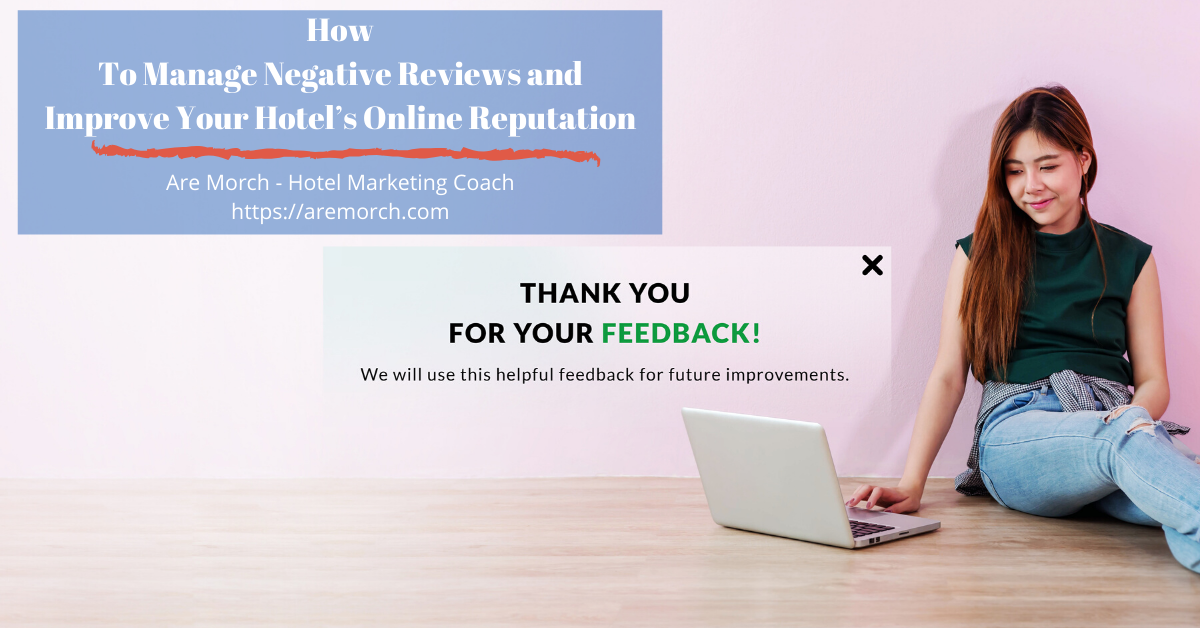Benjamin Franklin once said, “In this world, nothing is certain except death and taxes.” But, if you’re in the hotel business, you can add bad reviews to that list.
No matter how clean your rooms are, how cheerful your staff is, or how many amenities you provide, you simply can’t please everyone. Customer satisfaction is, unfortunately, largely based upon the mood of the individual when they sit down to write a review.
So, if a business deal fell through, the pillow may seem uncomfortable that night. Or, if a family’s vacation was rained out, they might shift their disappointment to the eggs in your continental breakfast. A couple arguing might be less patient with the kids in the adjacent room.
Ultimately, if you’re in the hospitality business, you’ll encounter bad reviews. But why do people feel the need to lash out in public forums?
Why people write negative reviews
You’ll encounter guests who go out of their way to rant just to get a discount or a refund. The hospitality industry is ripe with professional complainers. However, their threats are mostly empty, and they’ll rarely rant online. In other words, most people don’t write negative reviews simply because they’re a cheap curmudgeon.
The majority of guests who write bad online reviews do so because they felt they didn’t get what they paid for. They understand that things go wrong, but they expect you to make the situation right. If they couldn’t resolve the issue with the hotel manager, they might feel trapped, which will cause them to vent online.
These people believe in the value and they’re happy to pay for a great experience. But, if their visit doesn’t live up to their expectations, they’ll expect you to compensate them for the perceived loss of value.
How bad reviews hurt your hotel’s reputation
You might think online complaints stay buried on platforms like Yelp or Tripadvisor, only to be discovered when someone looks up your hotel on those websites. Sadly, Vegas rules don’t apply here. What happens in online review platforms gets shared, tweeted, discussed, emailed, and pulled into your search results…
Although you may have tens of thousands of positive reviews, it only takes a handful to sink your online reputation. Just look up “Marriott reviews” in Google. Which of these would you click on?
If you chose the one-star review near the top, you aren’t alone. Negative headlines often attract more clicks because people like to know the risks involved when spending money. Even worse, this ranks number two directly after the brand’s website!
What are people so mad about? It turns out, many of them lost deposits when they canceled their reservation, including people who canceled due to COVID-19. Cancelation fees might seem like they’re good for your bottom line, but the damage these negative reviews are doing far exceeds the refund amount.
If potential customers see that getting a refund is a hassle, they’ll probably opt for your competitor across the street instead. But, what if the competitor is behind those nasty complaints to siphon your business?
How to handle fake reviews from competitors
Sadly, not everyone is as ethical as you. If you’ve had a sudden flood of negative online reviews within a short period, you should investigate their legitimacy. Here are several tricks to spot fake reviews:
- Timeline: If you usually only get one or two reviews per month, and suddenly you got ten in a few days, they might be fraudulent.
- Lack of details: Do the complaints specify something in particular? If all they say is, “the staff was rude,” or “the room was dirty,” you should look more closely at them.
- No records of a visit: Can you match up the complaint with a known incident or documentation? If someone mentions complaining about a dirty room and asking to switch, you should have that request on file. If you don’t, it may be false.
- Competitor recommendations: This is a big one. Does the reviewer direct readers to a competitor instead? Most people wouldn’t do that when leaving feedback.
- Conflicts of interest: If the person’s name is visible, can you find any connections to an owner of a competing business? Underhanded competitors might ask friends or family members to leave bad reviews to hide their own identities.
If you have any doubts about the authenticity of a negative review, you should flag it and report it to the website. Most sites make it fairly simple to report violations, but the process differs for each platform.
Unfortunately, not all bad reviews are fake. So, if you can’t prove it, or you think it might be valid, you won’t be able to have it removed from the website. That means you’ll need to use some basic reputation management techniques to bury the unwanted reviews deeper in Google where fewer customers will find them.
How to suppress unwanted reviews in Google
A common misconception about reputation management is that it uses negative SEO to suppress unwanted content. The opposite is true. According to ReputationManagement.com, companies use a combination of content strategy, SEO, website development, and more to lift preferred content. As a result, negative content is pushed down in Google. Here are a few takeaways from that article:
- Establish an active presence on social media platforms. These profiles rank very well in Google for your brand name, so they’re a powerful tool when it comes to suppressing unwanted content in your search results.
- Claim and optimize your review platform profiles. Don’t put all your eggs in one basket. It’s important to spread reviews across several different platforms. Some customers are more familiar with one, so giving them options is a great way to boost your chances of getting reviews. Remember, customers can still leave reviews on a platform even if you don’t claim the profile.
- Create a travel blog using your hotel’s name. The more websites you control, the harder it is for negative content to land on the first page of Google. A blog is also an excellent way to attract customers with highly-relevant content.
- Build and optimize pages on your website for reviews. The best way to push down negative reviews about your hotel is to rank for the term yourself. But there are a few best practices to consider when adding these types of pages to your website. Check out this post for some solid advice about adding reviews to your site.
These are just a few ways to address negative reviews and improve your hotel’s online reputation. The best way to manage them is to avoid getting them in the first place with stellar customer service. Take a queue from the Marriott example above. Sometimes it’s worth absorbing a small loss of revenue upfront in exchange for a lifelong customer.
We are in this together!
I need to let you all know that we are in on this together. If you need to vent, talk, cry, or just have some to talk with then I am here listening. Since I am working part-time at the local Kroger, I will to the best of my ability to work it out around my schedule.
But you can reach me here:
Email: hotelblogger@aremorch.com
Also, join us at our Facebook Group – Hotel Social Media Community
We will get through this unprecedented event together! #hotelstrong #hospitalitystrong
For any specific information on COVID-19, I recommend go to CDC, WHO, AHLA, AAHOA, and HSMAI. Also, follow information from your local authorities.
NOTE
We are starting to reopen some hotels again (Yay!!!). Make sure you follow their guidelines and say THANK YOU to those that now show a unique spirit to serve, and helps us all get through this!! #hotelstrong #hospitalitystrong
About Are Morch
Hi, I am Are Morch. Your Hotel Marketing Coach and Customer Experience Expert that specializes in creating effective digital customer experience offer for hotels while growing and scale customer acquisition and revenue.
Get more from Are on Facebook | Twitter | LinkedIn | Pinterest | Instagram| Podcast






